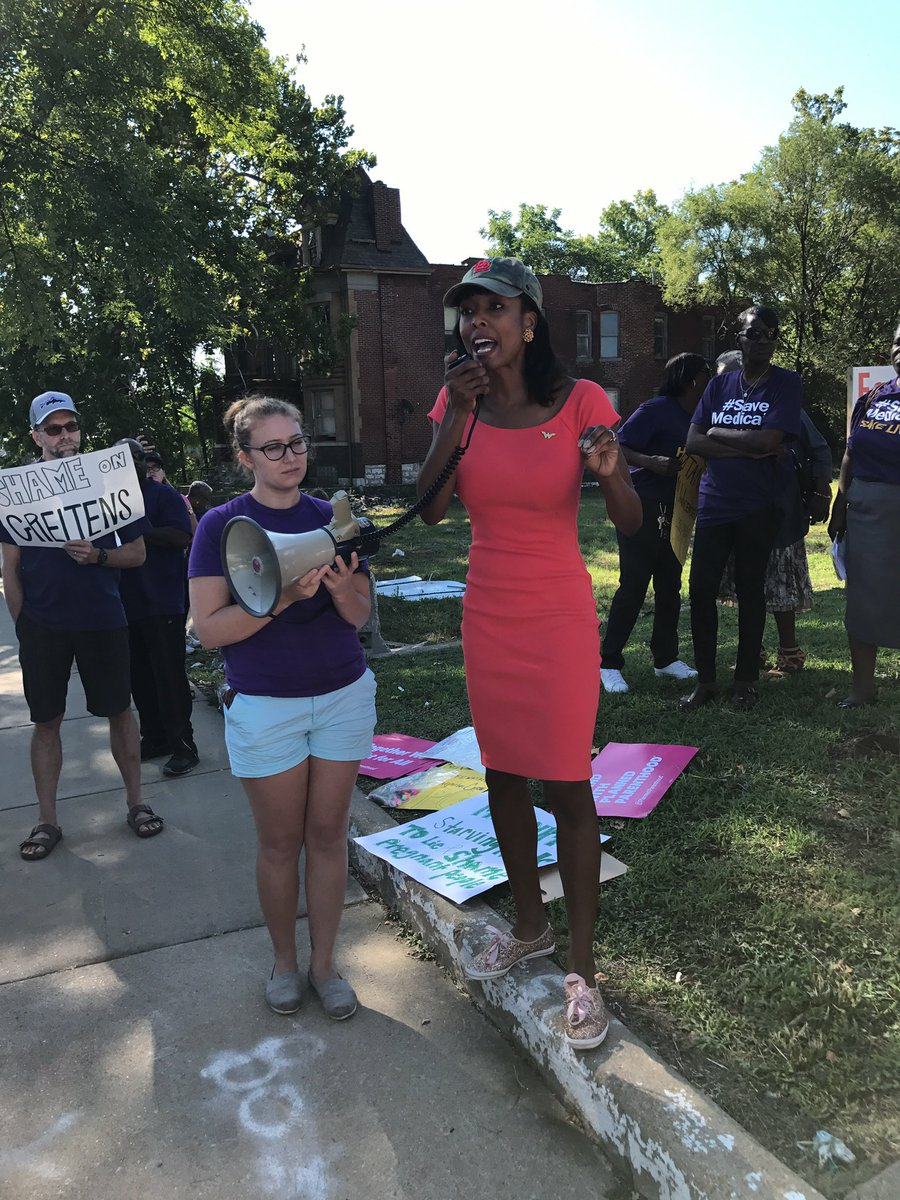Missouri state Rep. Cora Faith Walker is here to change her state's politics

While American politics continues to flounder, there are some glimmers of hope on the horizon. Take, for example, what’s happening in Jefferson City, Mo., where 33-year-old Democratic state Rep. Cora Faith Walker is about to complete her first year serving in the Missouri State House. Political insiders are keeping a close eye on Walker, a rising star in progressive politics, a tireless crusader for access to health care, and one of only three women of color now serving in Missouri’s state legislature. Walker is a beacon of hope to anyone who believes that women, and particularly women of color, will be playing a much greater role in politics in the years to come.
Walker represents the state’s 74th district, which includes Ferguson, the city in the St. Louis metro area. In 2014, the city became emblematic of the movement for black lives and the lethal effects of racial profiling when a young African-American man named Michael Brown was shot and killed there by a white police officer. Walker’s presence in the State House sends a clear message not only to her constituents and all Missourians, but to the country at large, that the story of Ferguson is far from over, and that the issues that Brown’s killing brought to light are not going to be swept under the rug. Instead, they will help reinforce the work that Walker insists upon: That the lives, health, and well-being of those systemically oppressed are worthy not only of attention but equal treatment.

For Walker, being a tireless advocate for people of color and others who face institutionalized marginalization isn’t just a heady, theoretical pursuit, but a calling rooted in her own experience.
“Growing up in the Deep South and in the Black Belt part of the country, I lived a life where I was exposed to a lot of different challenges that face our community — including poverty and poor health care outcomes,” Walker tells Yahoo Lifestyle. The state representative, who was born in St. Louis and raised in Tuskegee, Ala., explains that the life story of her father, a disabled combat veteran, had a “profound impact” on her career, including her decision to run for office.
“He had PTSD and a lot of demons when he came back from combat, which made it hard for him to get employment. He became homeless for a while. My mom ultimately gave him an ultimatum and said, ‘You have to go and get help.’ He finally went to the VA and accessed health care, doctors, and the emotional support he needed. He became a productive citizen. I saw firsthand how access to health care can impact someone’s life,” Walker recalls. It’s her father, she says, who inspired her to devote her life to ensuring that more people have access to health care.
My Hero. My Inspiration. My Daddy. TY for showing me what it truly means to be selfless & fearless.
Happy Veterans Day! pic.twitter.com/0x4OlpP7WM
— Cora Faith Walker (@CoraFaith4MO) November 11, 2016
After receiving her undergraduate degree from Washington University in St. Louis, Walker went on to obtain both a law degree and a master’s degree in public health before starting a career as a health care attorney. She was also involved in a number of public health organizations before ultimately making the decision to run for public office and take her concern for health care access out of the private sector and into the world of public policy.
Walker’s deeply personal connection to the intersection of health, family, and government does not end with her father. In late June of 2011, her 23-year old nephew began complaining of chest pains. As he was working part-time earning minimum wage while earning his associate’s degree at a local community college, he found himself, as Walker puts it, having to “make the decision between going to the doctor to get it checked out or keeping his job.” The young man did not have health insurance, as he was a part-time employee, and his minimum-wage earnings were not enough, he feared, to cover seeing a doctor while also supporting his family, which included a fiancée and 2-year-old daughter. Walker’s nephew died from a heart attack shortly after, while playing pickup basketball.
His death, Walker said, solidified her decision to ultimately “put my hat in the ring and run” — which she did in February 2016, when she announced her candidacy for state representative.
“I had been working from the outside in for a lot of years trying to influence health policy decision on the state level in Missouri, and after working with folks in the Capitol, I came to the recognition that my own personal background and professional expertise was a really important perspective to have in the ring for the state,” she says.
Today, Walker describes the focus of her work in the legislature as being, “around increasing access to quality, affordable health care for underserved communities, and marginalized communities and populations specifically.”

State Rep. Crystal Quade, another Democratic woman newly elected to the Missouri State House, says she considers Walker not only a colleague, but a friend. “She brings a perspective [to the legislature] that no one else can. Not only is she a person of color who has these personal experiences around health care and being a woman of color, but her professional experience and educational background is astounding,” Quade says. “There is truly no one who knows more about health care policy and its implications on women of color.”
Walker serves on the state’s Children and Families Committee — the committee with primary jurisdiction over legislation covering reproductive rights. In her first year in office, Walker has already sponsored a number of bills, including HB13, which would provide a tax credit of up to $500 a year for the cost of contraception. And when Missouri Gov. Eric Greitens, a Republican, called for a special session of the state legislature specifically to further restrict abortion rights, Walker took the House floor to ask her “pro-life” colleagues why they were not instead spending the time discussing the state’s infant mortality rates, which far exceed the national average and are especially high in impoverished communities and communities of color.
The infant mortality rate in St. Louis for African-American woman, should NOT rival that of 3-world countries. #beinformed #moleg pic.twitter.com/vBEQObscOt
— Cora Faith Walker (@CoraFaith4MO) March 17, 2017
“It’s no secret that in Missouri, the folks that are in power in the majority are working towards making Missouri the most restrictive state when it comes to access to abortion and reproductive health care in general,” she says. “And for me, one of the most effective ways I’ve been able to talk about the issues is to look at facts and have the ability to understand the reality of the ways in which these restrictive policies impact communities of color.”
Walker continues, “When we talk about things like the movement for black lives or economic security or issues like infrastructure, there are a lot of intersections between all of that and women’s reproductive health. One of the benefits and beauties of being a black woman is that you live life in terms of intersections. It’s things like that that mean I am able to identify and explain those intersections more to folks who might not think about these issues in a holistic way.”
Walker’s dedication has been noticed. Ilyse Hogue, president of NARAL Pro-Choice America, tells Yahoo Lifestyle that Walker is someone “who gives [her] hope for the future.”
“Cora sees all the obstacles, but she has a vision for how you get around them and how you get to the information you need to get to — in the way an expert skier would navigate a Black Diamond slope,” Hogue explains. “She sees a line through the boulders and trees and is going to follow it and inspire others to follow her, because her vision is so clear. Asking people to be blindly optimistic is not realistic or rational. But she says we must hold a vision for ourselves and our families that things will get better and plot a path forward. That’s what inspires such confidence.”
Activist and educator Brittany Packnett has known Walker since they were both undergraduates at Washington University.
“I think people should know that Cora is really incredibly brave,” Packnett tells Yahoo Lifestyle. “Her journey to elected office was not in any way easy. It was very fraught with a lot of regional challenges, but she stayed focused. She kept her eye on the prize, and in her estimation, the prize was that Ferguson would not only have a strong voice and a committed voice in our state legislature, but a voice of truth. [Walker is] a black woman in elected office in a state where progressives are in the minority. She is in the minority in multiple ways in the State House, but she manages to stay true to why she decided to run in the first place.”

Walker’s commitment to her own authenticity, honesty, and values extends to coming forward about the way sexual violence has intervened in her professional life. In October 2016, just two months after winning her seat in the State House, she went public with accusations of sexual assault against a fellow Democrat and soon-to-be colleague in the legislature. It should be noted that the man she accused of rape, state Rep. Steve Roberts Jr., responded by filing a defamation suit against her, which, according to a newspaper report, presented a picture of their relationship that conflicted with hers. Pending litigation prevents Walker from discussing the details of her allegations, and Roberts’s counter-narrative, but she notes that seeing the wave of #MeToo stories emerge since the New York Times’ report on Harvey Weinstein in October has been “triggering, but also incredibly empowering.”
“The epidemic of sexualized violence in our society has been perpetuated by shame and silence,” she says. “I’m really glad to see some of those walls to start toppling.”
“Cora’s willingness to step forward around and be public around her sexual assault is very indicative of who she is,” Hogue says. “She has nothing to gain from it and a lot to lose from it.”
“Before this conversation was considered an important one, Cora was having it,” Packnett says. “Being vulnerable and putting her reputation and personal and political future on the line to tell the truth. As black women, stories of abuse are so often ignored, so it’s especially courageous.”

Walker’s story, according to fans and supporters, is really about a woman whose very presence not only defies the political status quo, but projects what a truly representative American democracy can look like.
As Hogue says, “By recognizing Cora’s leadership and courage in her own community, we change the equation of what we value, and we nationalize that recognition. We say that we value a different model of leadership that is women-centric, that places as much of a premium on making change in your community for your neighbors as we do on trying to be in the White House.”
Or as Walker herself says, “I am so much more than just one singular experience. I am the love and the pain and the resilience and the grit and the compassion. And for me, it’s not in spite or despite what happened to me. It’s because of what happened to me that I am all of those things and more.”
Walker could very well be talking about the city she represents. Or the future of a deeply divided country, still trying to figure out how to forge its way into the future.
Read more from Yahoo Lifestyle:
Women who’ve accused President Donald Trump of sexual harassment ask Congress to investigate
Trent Franks offered $5 million, but how much does hiring a surrogate really cost?
Texas students were forced to do ‘bear crawls’ at school, and the internet has a lot of feelings
Follow us on Instagram, Facebook, and Twitter for nonstop inspiration delivered fresh to your feed, every day.
